
Are you looking for a better way to protect your privacy online? While traditional VPNs are a popular choice, a new player is changing the game: decentralized VPNs. These tools offer a unique approach to internet security by ditching the central server model, giving you more control over your data and a truly private browsing experience.
This guide will explain what a decentralized VPN is and how it works. We’ll explore the benefits, look at some of the top tools available, and answer your most common questions. Let’s dive into the future of online privacy.
What Are Decentralized VPNs and How Do They Work?
A traditional VPN service routes your internet traffic through a private server owned by a single company. While this hides your IP address, you have to trust that the VPN provider isn’t logging your activity or collecting your data.
Decentralized VPNs (dVPNs) operate differently. Instead of relying on a central company, they use a peer-to-peer (P2P) network. This means the network is made up of individual users from all over the world who share their spare bandwidth. When you use a dVPN, your connection is routed through a series of these user-operated nodes, making it nearly impossible for anyone to track your digital footprint.
Think of it like this: a traditional VPN is like sending a letter through a single, private post office. A decentralized VPN is like having your letter passed along by a crowd of people, each one only knowing the person who handed it to them and the person they’re giving it to next. No single person sees the entire journey.
Key Benefits of Using a Decentralized VPN
Switching to a dVPN brings several powerful advantages over the standard model. You get enhanced security, greater privacy, and a more resilient network that is much harder to shut down.
Unbeatable Privacy and Anonymity
The biggest draw for decentralized VPNs is the promise of true anonymity. Since there’s no central server, there’s no single entity that can log your browsing history, connection times, or personal data. Your traffic is encrypted and spread across a distributed network, making you effectively invisible online. This eliminates the risk of a VPN company handing over your data to authorities or suffering a data breach.
Enhanced Security
Decentralized networks are inherently more secure. Without a central point of failure, they are incredibly resistant to cyberattacks and censorship. If one node on the network goes down or is blocked, your traffic is simply rerouted through another. This creates a robust and reliable connection that keeps you online and secure, even in restrictive environments.
No More Trust Issues
With a traditional VPN, you’re placing your trust in a company’s promises. You have to believe their “no-logs” policy is real. Decentralized VPNs remove this need for trust. The technology itself is designed to be trustless. The system’s code is often open-source, meaning anyone can inspect it to verify its security claims.
Top Decentralized VPN Tools on the Market
The dVPN space is growing fast, with several innovative projects leading the way. I’ve personally tested a handful of these apps and want to share what it was like using them, along with some practical tips. (I’ll be adding screenshots in the sections below so you can see exactly what to expect!)
Sentinel (DVPN)
Sentinel is a blockchain-based marketplace for bandwidth, letting anyone share or buy internet access through a secure, decentralized network. There are multiple dVPN applications built on this protocol—here’s what my experience looked like:
- Solar dVPN:
I downloaded Solar dVPN on my Android phone. Setting up an account was straightforward—I just followed the prompts and, within minutes, I was ready to subscribe. I really liked that you can choose between a traditional subscription or paying with cryptocurrency. After depositing funds, it was as simple as tapping “Connect” and selecting a server node. All my traffic was instantly encrypted, and I could browse securely without any hassle.
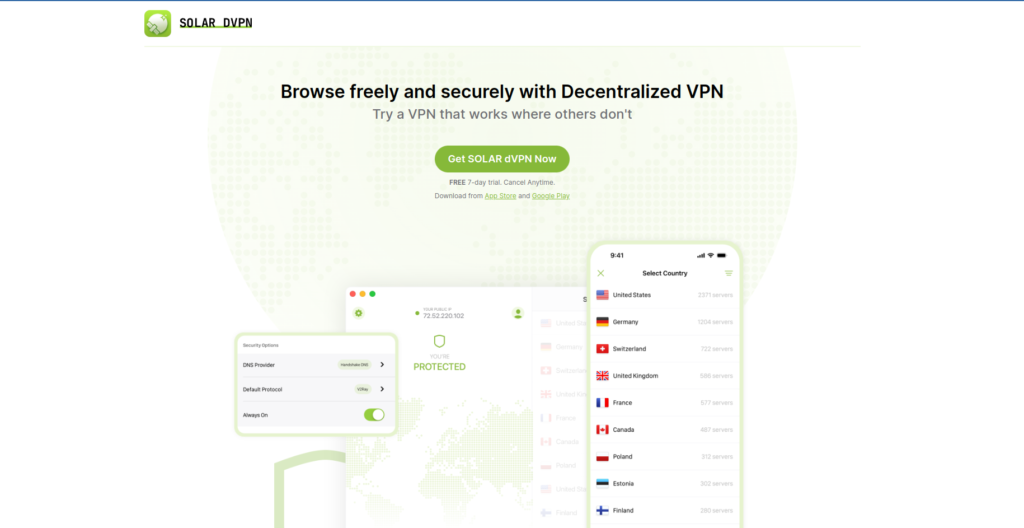
A mobile app which is available for iOS and Android. You can register an account and buy a subscription to use it. To do that go to your profile by clicking an icon in the top right corner, then click the subscribe button and follow an instruction.
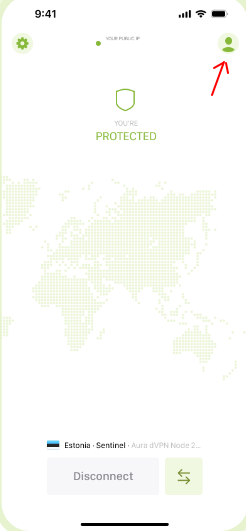
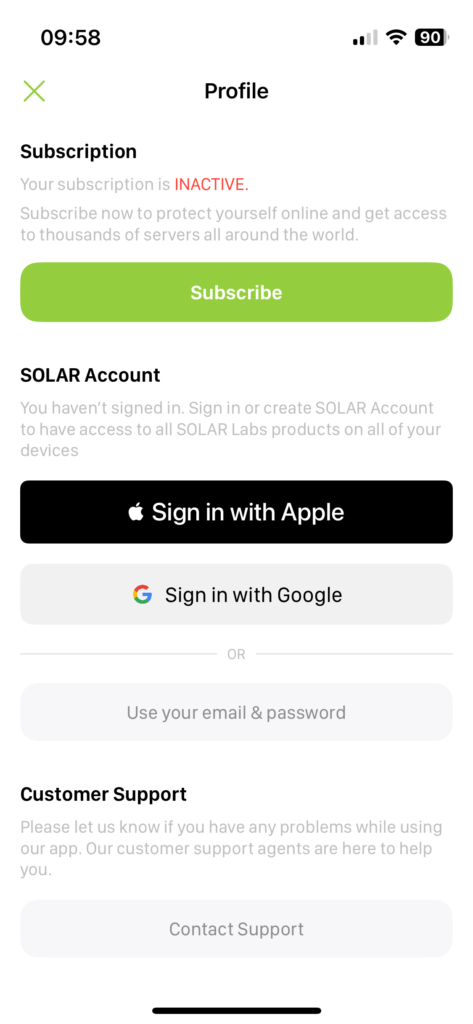
Another option is to pay with Sentinel dVPN cryptocurrency. You can find the crypto wallet address for depositing funds when you click Settings in the left top corner, then go to Advance.
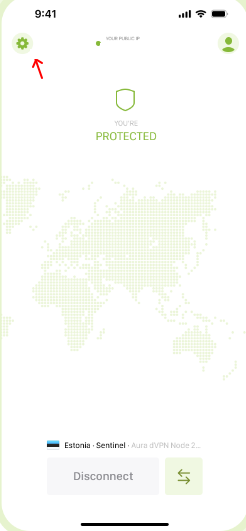
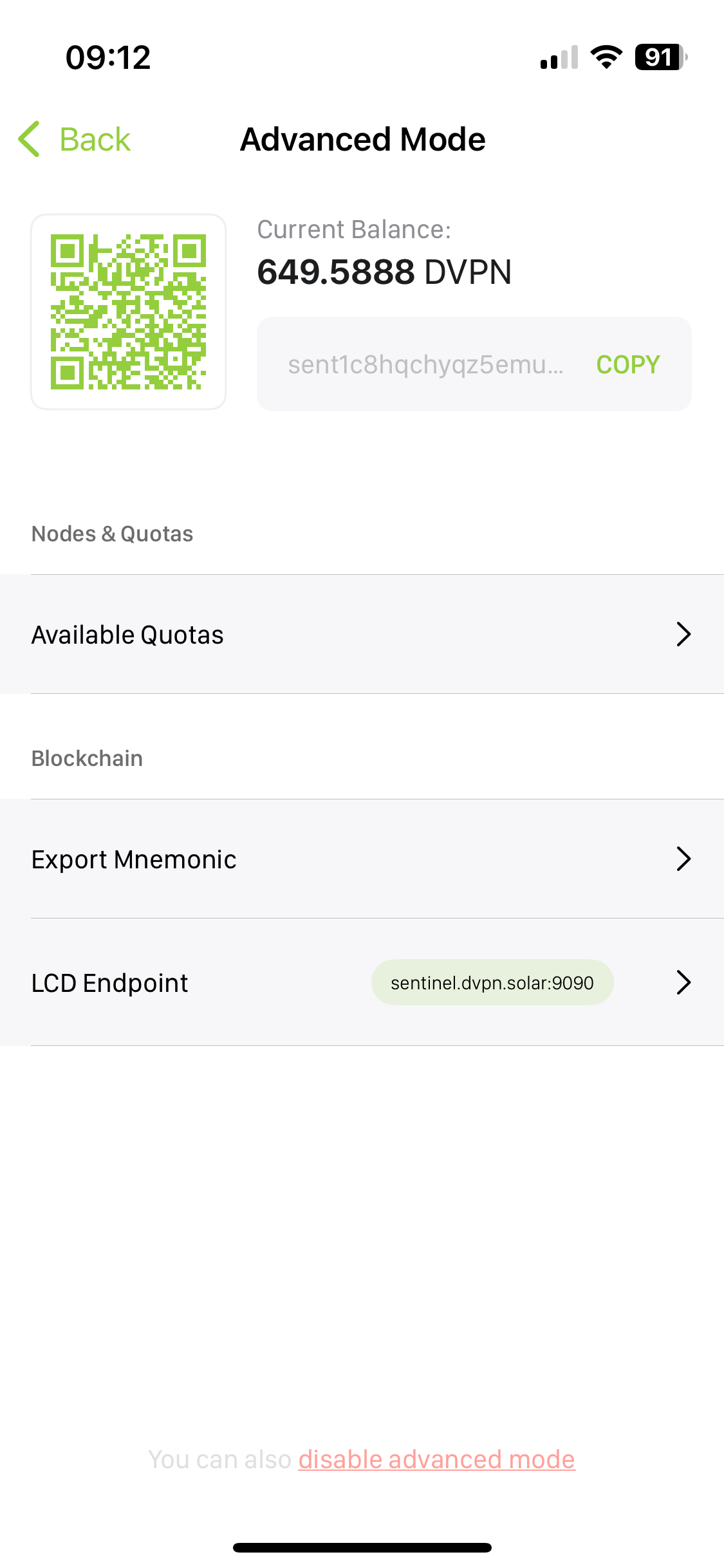
If you like to pay with crypto, you will need an appropriate cryptocurrency wallet. Sentinel documentation provides a detailed instruction on how to create one.
After depositing funds and clicking Connect you can select a connection you need. Once connected, all your traffic is encrypted through a decentralized VPN tunnel.
– Meile dVPN
On my desktop, I tried Meile dVPN. The app is open-source and available for Windows, Mac, and Linux. After downloading it from the official site, I created a wallet and deposited some funds. The subscription process let me pick either bandwidth or hourly options—super flexible! Once I selected a connection and activated the VPN, everything worked as advertised. Managing subscriptions and switching servers was also straightforward.
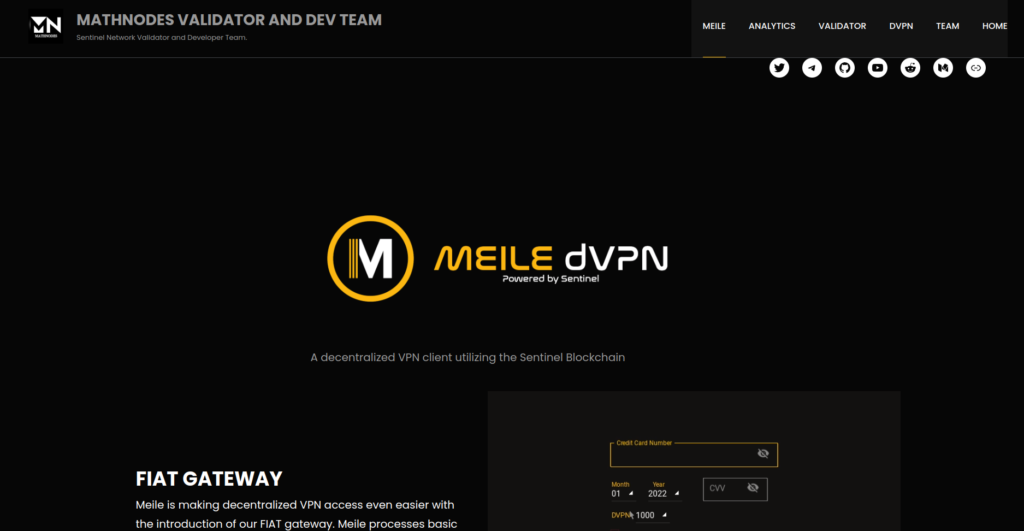
A desktop app that is available for Windows, Mac, and various Linux distributions. You can find download links on a Meile landing page. This is an open-source software, so you can also download it directly from their Github repository.
After opening the application, you will need to go to Wallet tabs for funds deposit
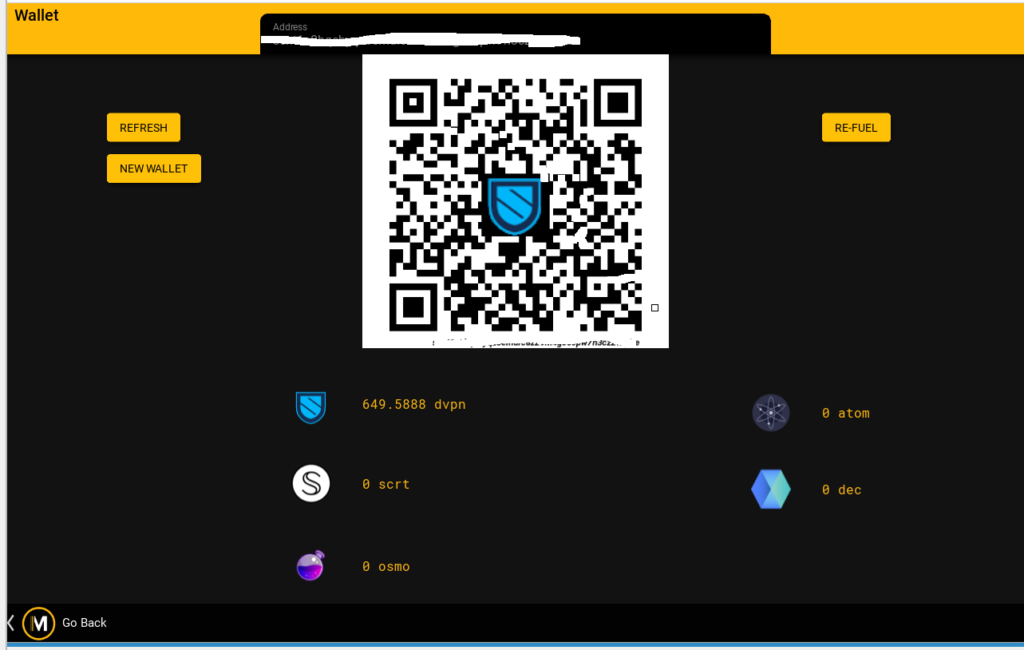
Once funds are deposited, you can go to the Subscriptions tab and select a preferred connection.
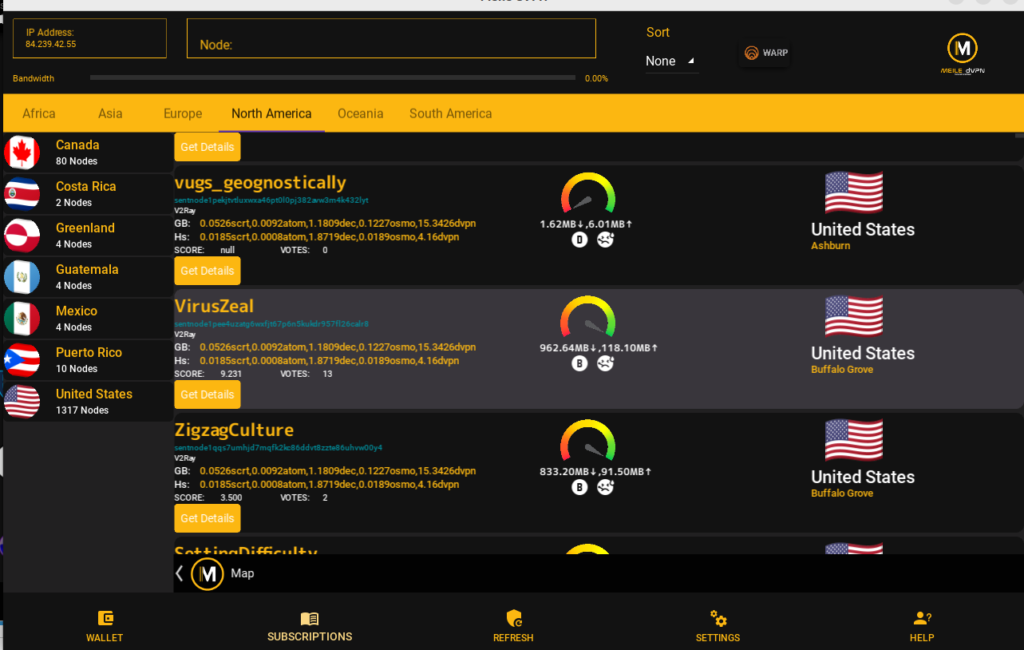
After selecting a connection you will be asked to choose a Subscription type. It can be either Bandwidth (GB) or Hourly.
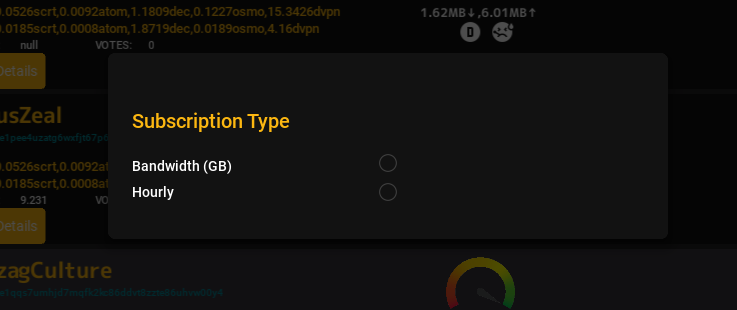
After selecting the GB amount(in case the subscription is Bandwidth), or hours duration(in case the Subscription is Hourly), you will be connected to a VPN. All subscriptions can be managed in the Subscriptions tab.
Mysterium Network
Mysterium Network also uses a P2P approach where you can even run your own node to earn crypto. I installed the Mysterium VPN app, paid for bandwidth, and was able to choose from a global selection of peers. The connection was stable, and the app had a friendly interface.
Orchid
Orchid caught my attention with its unique multi-hop routes and the ability to pay using probabilistic nanopayments. While the setup is a bit different and involves topping up with OXT tokens, the added privacy is a huge plus for those seeking max anonymity. The app allows you to layer multiple providers to further obscure your traffic.
Are Decentralized VPNs a Good Choice for You?
Decentralized VPNs offer a compelling alternative to traditional services, but are they right for everyone? They provide superior privacy and security by removing the central point of control. If your primary goal is to ensure no single company holds your data, a dVPN is an excellent choice.
However, the technology is still new. This can sometimes mean connection speeds are less consistent than with premium traditional VPNs. The user experience can also be more complex, especially if you want to pay with cryptocurrency. But for those who value privacy above all else, the benefits of decentralized VPNs are hard to ignore.
Frequently Asked Questions (FAQs)
1. Are decentralized VPNs legal?
Yes, using a decentralized VPN is legal in most countries, just like traditional VPNs. The legality depends on what you do online, not the tool you use to do it.
2. Are dVPNs faster than traditional VPNs?
Not always. Speed can vary depending on the number of nodes available and their location. While traditional VPNs often have dedicated high-speed servers, dVPN performance relies on the quality of the P2P network.
3. Do I need cryptocurrency to use a decentralized VPN?
It depends on the service. Many dVPNs are built on blockchain technology and use cryptocurrency for payments. However, some apps, like Solar dVPN, also offer traditional subscription payment methods.
4. Are decentralized VPNs completely free?
Generally, no. While the software might be free to download, you are paying other users on the network for the bandwidth you use. This pay-as-you-go model can be very cost-effective compared to a monthly subscription.
The Future of Online Privacy
Decentralized VPNs represent a major step forward in the quest for a truly private and open internet. By distributing power away from single companies and back to users, they create a more secure, resilient, and censorship-resistant network for everyone.
As the technology matures and becomes more user-friendly, dVPNs are poised to become an essential tool for anyone serious about protecting their digital life. If you’re ready to take control of your online privacy, exploring the world of decentralized VPNs is a great place to start.

Leave a Reply